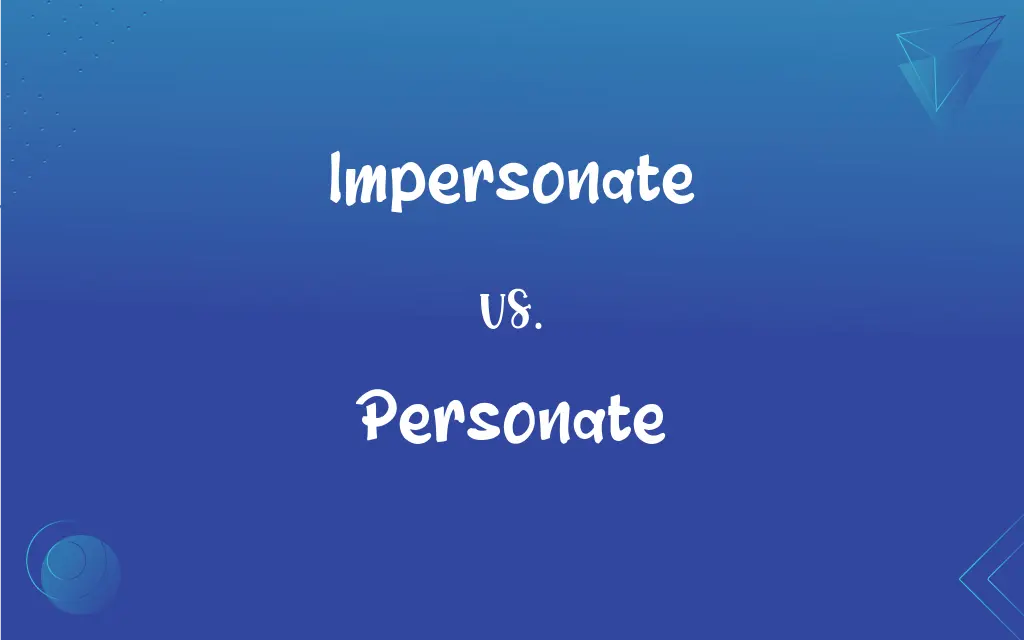Impersonate vs. Personate: What's the Difference?
Edited by Aimie Carlson || By Janet White || Updated on September 21, 2023
Impersonate means to pretend to be someone else for deception, while Personate refers to representing or embodying a character or quality.

Key Differences
Impersonate and Personate, while similar, possess distinct nuances. Impersonate typically involves mimicking or pretending to be someone else, usually for deception. On the other hand, Personate can mean representing a character or embodying a certain quality without the deceptive element.
In the realm of entertainment, actors might Personate a character from a script, giving them life and emotions. In contrast, someone might Impersonate a celebrity, copying their voice, mannerisms, and looks, sometimes for comedic effect or to deceive others.
In legal contexts, Impersonate usually has a negative connotation, indicating fraudulent activities like impersonating a police officer. Personate, while less common in this context, can also mean assuming another's identity, but it doesn't always imply a malicious intent.
Historically, both Impersonate and Personate were used interchangeably, but modern usage has given them their separate identities. Today, Impersonate is more widely recognized and used, whereas Personate is rarer and might sound archaic to some.
Both terms revolve around the act of taking on another identity or character. However, it's crucial to note the underlying motivation: Impersonate often carries deceptive undertones, while Personate leans more towards representation without deceit.
ADVERTISEMENT
Comparison Chart
Main Purpose
To pretend to be someone else for deception
To represent or embody a character or quality
Common Usage
In deception, mimicry, entertainment
In acting, embodying qualities
Connotation
Often negative (fraudulent)
Neutral or positive
Historical Usage
Used interchangeably with Personate
Same as Impersonate
Frequency in Modern Language
More common
Less common, sometimes considered archaic
ADVERTISEMENT
Impersonate and Personate Definitions
Impersonate
To mimic or portray someone else, often to deceive.
He tried to Impersonate the CEO to gain access to the office.
Personate
To embody a particular quality or attribute.
He can Personate kindness and compassion in all situations.
Impersonate
To act or perform as another character, especially in entertainment.
The comedian can Impersonate several celebrities.
Personate
To personify or give human characteristics to.
The story Personates nature as a caring mother.
Impersonate
To assume the identity of another with fraudulent intentions.
Scammers often Impersonate government officials over the phone.
Personate
To represent or act as a character, especially in a play.
She will Personate Cleopatra in the upcoming theater production.
Impersonate
To feign the appearance or characteristics of someone else.
He can Impersonate his twin brother perfectly.
Personate
To assume the character or appearance of, especially without fraudulent intent.
For the historical reenactment, he will Personate a Civil War general.
Impersonate
To resemble or look like another person or character.
With that makeup, she can Impersonate any Hollywood actress.
Personate
To play the role or portray the part of (a character).
Impersonate
To assume the character or appearance of, especially fraudulently
Impersonate a police officer.
Personate
To assume the character or appearance of, especially fraudulently; impersonate.
Impersonate
To imitate the appearance, voice, or manner of; mimic
An entertainer who impersonates celebrities.
Personate
Having two lips, with the throat closed by a prominent palate. Used of a corolla, such as that of the snapdragon.
Impersonate
(transitive) To pretend to be (a different person); to assume the identity of.
The conman managed to impersonate several executives.
Evil can and will always impersonate goodness.
Personate
(transitive) To fraudulently portray another person; to impersonate.
Impersonate
To operate with the permissions of a different user account.
Personate
(transitive) To portray a character (as in a play); to act.
Impersonate
To manifest in corporeal form; to personify.
Personate
(transitive) To attribute personal characteristics to something; to personify.
Impersonate
To invest with personality; to endow with the form of a living being.
Personate
(transitive) To set forth in an unreal character; to disguise; to mask.
Impersonate
To ascribe the qualities of a person to; to personify.
Personate
To celebrate loudly; to extol; to praise.
Impersonate
To assume, or to represent, the person or character of; to personate; as, he impersonated Macbeth.
Benedict impersonated his age.
Personate
Having the throat of a corolla nearly closed by a projection of the base of the lower lip (in a way reminiscent of a mask), as in the flower of the snapdragon.
Impersonate
Assume or act the character of;
She impersonates Madonna
The actor portrays an elderly, lonely man
Personate
To celebrate loudly; to extol; to praise.
In fable, hymn, or song so personatingTheir gods ridiculous.
Impersonate
Represent another person with comic intentions
Personate
To assume the character of; to represent by a fictitious appearance; to act the part of; hence, to counterfeit; to feign; as, he tried to personate his brother; a personated devotion.
Impersonate
Pretend to be someone you are not; sometimes with fraudulent intentions;
She posed as the Czar's daughter
Personate
To set forth in an unreal character; to disguise; to mask.
Personate
To personify; to typify; to describe.
Personate
To play or assume a character.
Personate
Having the throat of a bilabiate corolla nearly closed by a projection of the base of the lower lip; masked, as in the flower of the snapdragon.
Personate
Pretend to be someone you are not; sometimes with fraudulent intentions;
She posed as the Czar's daughter
Personate
Attribute human qualities to something;
The Greeks personated their gods ridiculous
Personate
To depict or portray in a particular manner or aspect.
The painting Personates the queen in her younger days.
FAQs
What does Impersonate mean?
Impersonate means to pretend to be someone else, especially for deceptive purposes.
How does Personate differ from Impersonate?
Personate refers to representing or embodying a character or quality, often without deceptive intent.
Is Impersonating someone illegal?
Impersonating someone with intent to deceive or commit fraud is illegal in many jurisdictions.
Can an actor be said to Impersonate a character?
While actors can Impersonate real people, they usually Personate fictional characters.
What is the main negative connotation of Impersonate?
Impersonate often implies deceit or fraud.
Can one Personate feelings or emotions?
Yes, one can Personate feelings by embodying or representing them genuinely.
In what contexts might Personate be used?
Personate can be used in acting, literature, or when referring to embodying qualities or characteristics.
Are there synonyms for Impersonate?
Yes, mimic, imitate, and simulate are a few synonyms.
Can Personate be used in a positive context?
Yes, Personate can be used to describe representing or embodying a character or quality positively.
Which term is more common in everyday language?
Impersonate is more commonly used than Personate in modern English.
Is Personate an outdated term?
While still understood, Personate is less common and might be considered archaic by some.
How did the usage of these terms evolve?
Historically, they were used interchangeably, but modern usage has distinguished them.
Does Personate always imply a genuine representation?
Not always, but it generally lacks the deceptive undertones of Impersonate.
Are there synonyms for Personate?
Represent, embody, and depict can be synonyms for Personate.
Is it wrong to use Personate when referring to deceptive acts?
While not technically wrong, using Impersonate would be clearer when referring to deception.
About Author
Written by
Janet WhiteJanet White has been an esteemed writer and blogger for Difference Wiki. Holding a Master's degree in Science and Medical Journalism from the prestigious Boston University, she has consistently demonstrated her expertise and passion for her field. When she's not immersed in her work, Janet relishes her time exercising, delving into a good book, and cherishing moments with friends and family.
Edited by
Aimie CarlsonAimie Carlson, holding a master's degree in English literature, is a fervent English language enthusiast. She lends her writing talents to Difference Wiki, a prominent website that specializes in comparisons, offering readers insightful analyses that both captivate and inform.































































